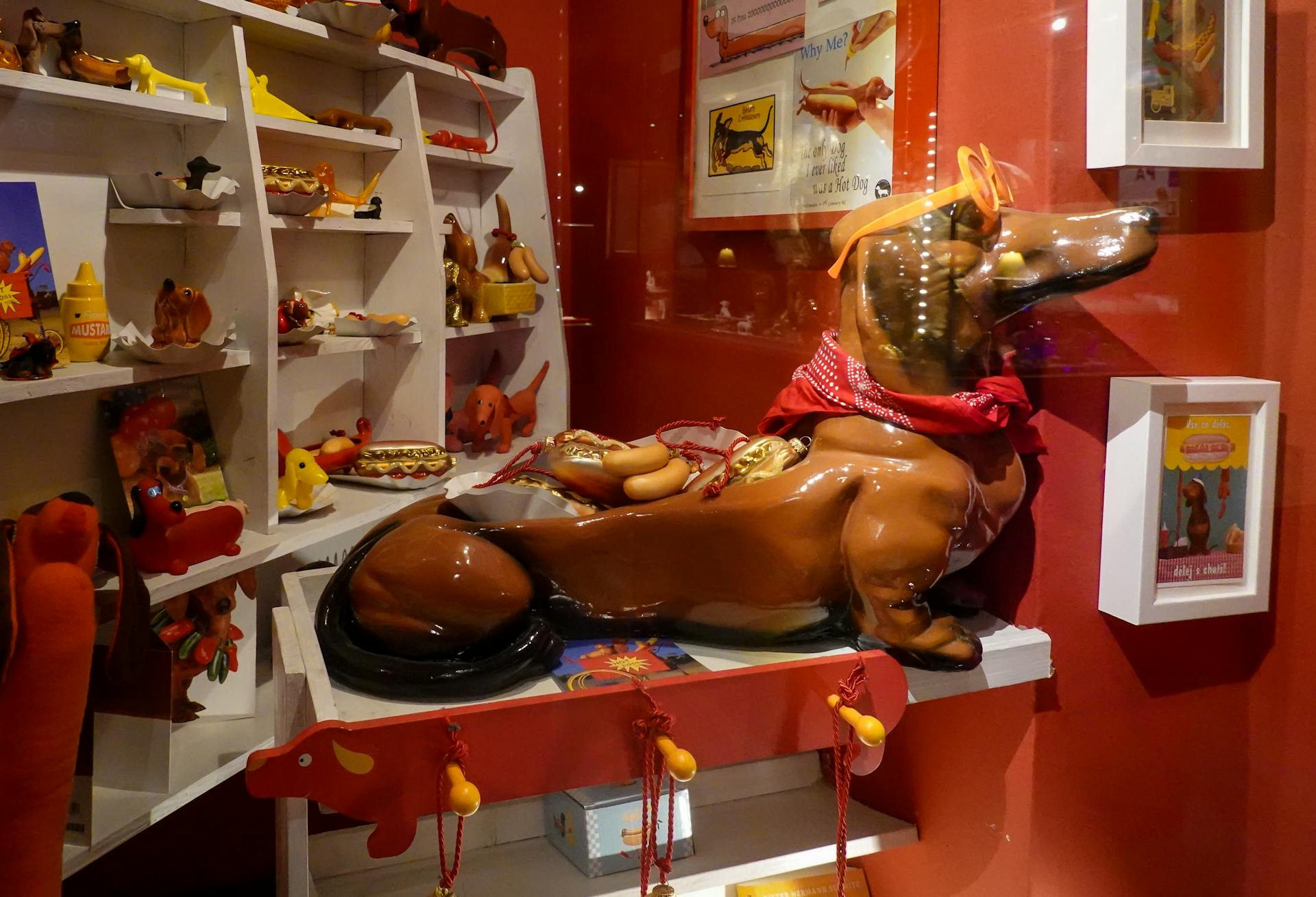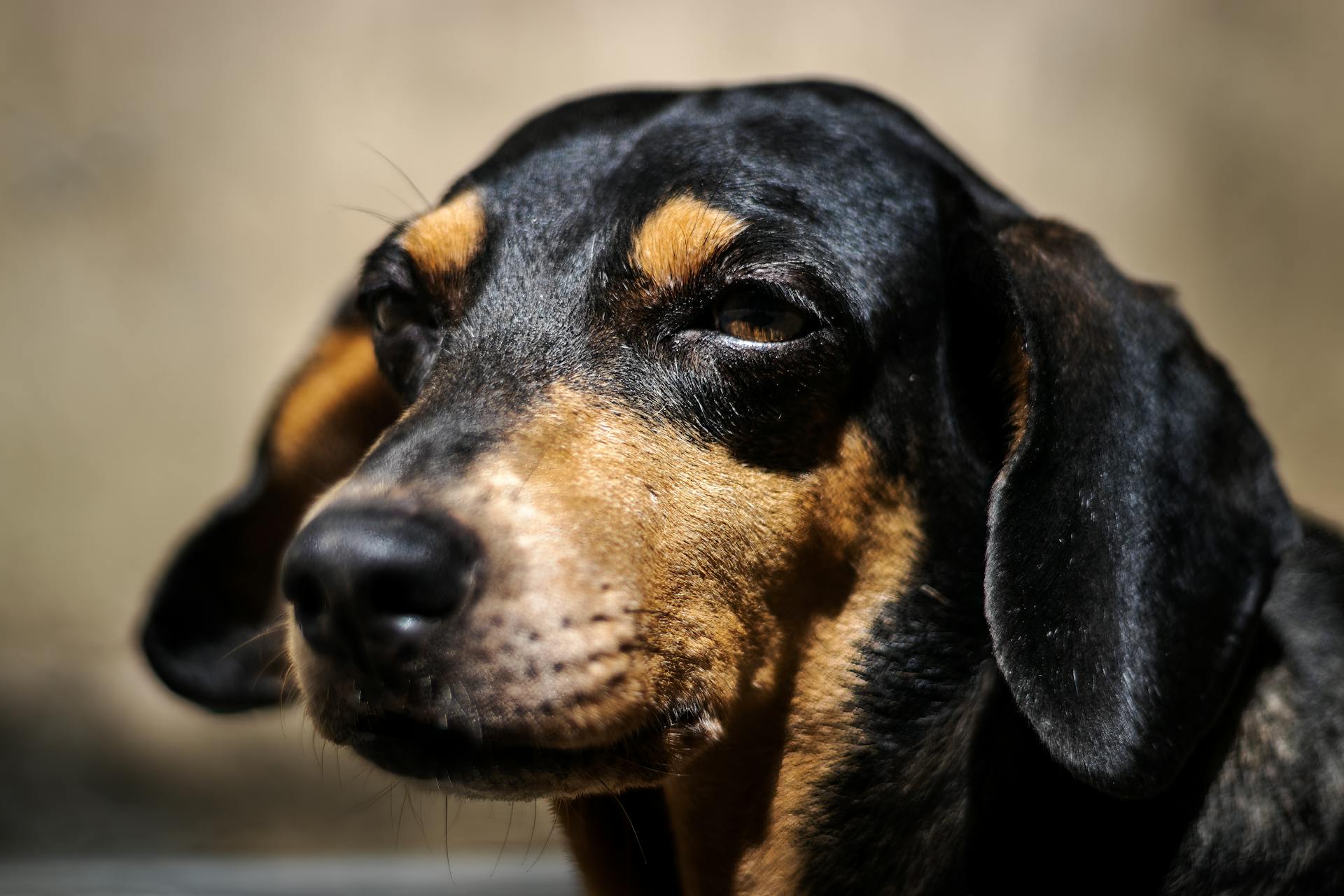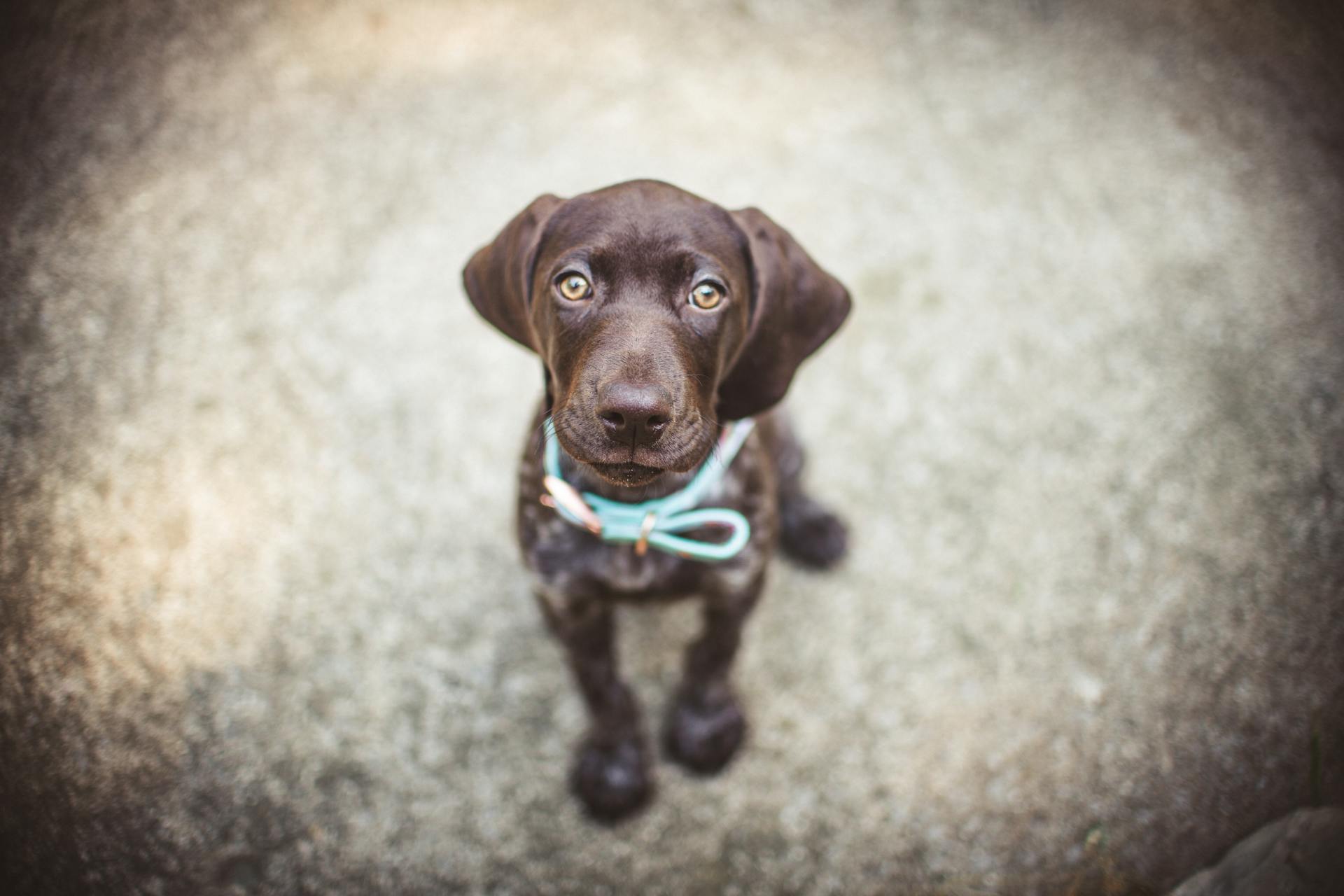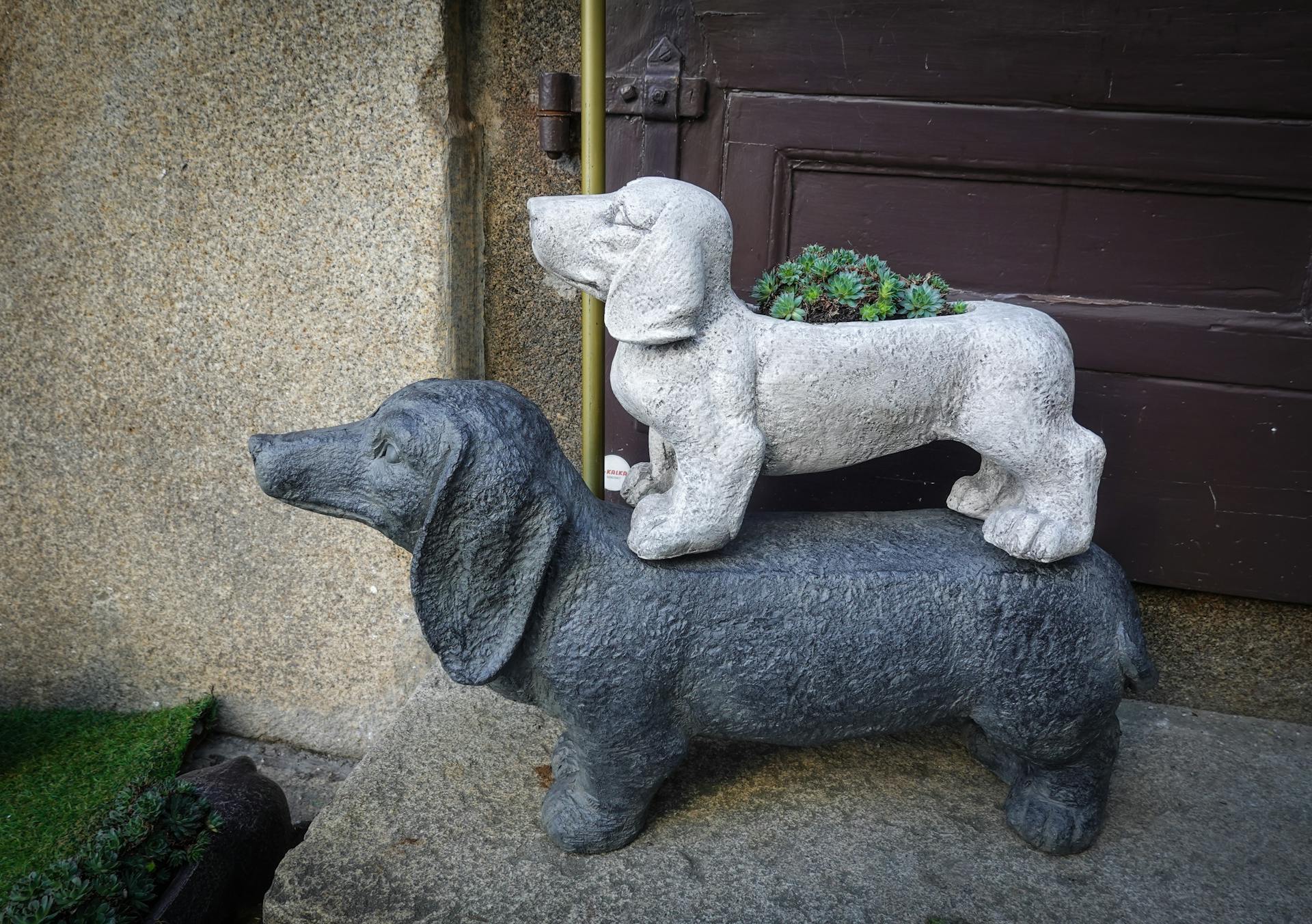
Dachshund reverse sneezing is a relatively common condition that can be alarming to witness, but in most cases, it's not a cause for concern. This condition is also known as inspiratory paroxysm.
Dachshunds are particularly prone to reverse sneezing due to their long, narrow head shape and elongated soft palate. This anatomy can cause the soft palate to partially obstruct the airway, leading to the characteristic rapid, forceful inhalations.
Reverse sneezing episodes in dachshunds can be triggered by a variety of factors, including allergies, nasal mucus, and even excitement. In some cases, the trigger may be unknown.
Check this out: Can Prong Collars Cause Tracheal Collapse
Causes and Prevention
Dachshunds can be prone to reverse sneezing, and it's essential to understand the causes to prevent and manage these episodes.
Getting overly excited can trigger reverse sneezing in your dachshund, so try to keep them calm and composed, especially during playtime.
Pollen, dust, or allergens can also cause reverse sneezing, so if your dachshund is experiencing episodes during certain times of the year, it might be worth considering allergy testing.
Recommended read: Why Are Dachshunds so Stubborn
Perfumes can be a surprise trigger, so if you notice your dachshund reverse sneezing after being near strong scents, try to avoid them.
Post-nasal drip or nasal inflammation can cause reverse sneezing, so if your dachshund is experiencing persistent nasal issues, consult with your veterinarian.
Rapid eating and drinking can also trigger reverse sneezing, so try to feed your dachshund slowly and give them plenty of water breaks.
Here are some common causes of reverse sneezing in dachshunds:
- Pollen, dust, cigarette smoke, or other irritants
- Rapid eating and drinking
- Getting overly excited
- Foreign substances in the throat
By understanding these causes, you can take steps to prevent and manage reverse sneezing episodes in your dachshund.
Symptoms and Diagnosis
Reverse sneezing in dachshunds can be diagnosed based on its characteristic appearance, often without the need for additional tests. If you catch a video of the episode, it makes diagnosis even easier.
Occasional episodes of reverse sneezing can be normal, but if your dachshund is suddenly having repeated episodes over a period of hours or a few days, it's a good idea to make a vet appointment. This is especially true if your dog is also pawing at their nose or doing "regular" sneezing too.
A sudden onset of reverse sneezing could be due to a flare-up of seasonal allergies, but it's also possible that something is stuck in your dog's nose or back of the throat, such as a foxtail. The sooner you get it out, the better.
How Is Diagnosed?

Diagnosing reverse sneezing in dogs is often straightforward due to its characteristic appearance.
Because of this, a diagnosis is often made based on the description of the episode and the lack of other symptoms.
If a video of the episode is captured, it can make diagnosis even easier for veterinarians.
In some cases, a vet may recommend additional diagnostics to rule out other medical conditions.
Sneezing Process
A reverse sneeze is a natural response to an irritant in the nasal passages, where air is rapidly pulled in through the nose.
During a reverse sneezing episode, your pet may stand still, extend their head and neck, and make snorting or honking sounds. This can last for several seconds or longer, but is not harmful.
Air is rapidly pulled in through the nose to expel something from the nose, which is the same concept as a normal sneeze, but in reverse.
Brachycephalic breeds, like boxers, pugs, and bulldogs, are more likely to have reverse sneezing due to their smaller throats. Tiny and small breeds are also prone to this condition.
The sneezing usually stops after your pet exhales through the nose.
On a similar theme: Double Coated Cat Breeds
Dogs
Dogs can experience reverse sneezing, which is characterized by rapid inhalation of air through the nose, often accompanied by snorting or honking sounds. This can last for several seconds or longer, but is usually not harmful.
During a reverse sneezing episode, dogs may stand still, extend their head and neck, and exhibit distress. The exact origin of reverse sneezing is not known, but it can be triggered by irritation in the back of the throat, such as dust, pollen, smoke, or other allergens.
If your dog is experiencing sudden onset reverse sneezing, it's a good idea to make a vet appointment, especially if they're also pawing at their nose or doing regular sneezing. This could be a sign of a more serious issue, like a foxtail stuck in their nose or back of the throat.
Benadryl (diphenhydramine) may help decrease the frequency of reverse sneezing in dogs, but consult with your vet before giving it to your dog. Keep in mind that some medications can be harmful, so it's essential to get a vet's approval first.
If you're trying to stop reverse sneezing in your dog, staying calm is essential, as dogs are highly sensitive to their parents' emotions. Gently rubbing your dog's throat or getting them to swallow may also help stop the spasms or flush out irritants.
On a similar theme: How to Stop Cat Zoomies at Night
Frequently Asked Questions
When should I worry about reverse sneezing?
Consult a veterinarian if your dog's reverse sneezing episodes are severe, recurring, or accompanied by difficulty breathing
What can be mistaken for reverse sneezing in dogs?
Reverse sneezing in dogs can be mistaken for respiratory distress, coughing, or choking, making it essential to identify the correct cause of the symptoms. Understanding the difference is crucial for providing proper care and treatment.
Sources
- https://chfa.net/resources/blog/441-reverse-sneezing-in-dogs-what-it-sounds-like-and-what-to-do
- https://dogtime.com/dog-health/52371-dog-honking-reverse-sneezing
- https://toegrips.com/reverse-sneezing-in-dogs/
- https://www.lonetreevet.com/blog/the-reverse-sneeze-what-it-is-and-when-to-worry/
- https://www.bartonheights.com/site/blog/2022/04/25/all-about-the-reverse-sneeze-in-dogs
Featured Images: pexels.com


